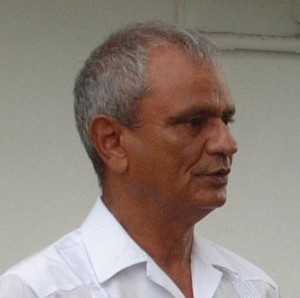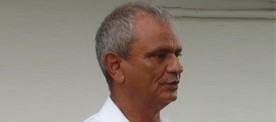Hope for Haiti
 I am sure that many of you will recall the shocking images which went around the world in the aftermath of the devastating earthquake in Haiti in 2010. The scale of the devastation was quite shocking, even for a world that is getting used to scenes of terrible destruction following natural disasters. Over 100,000 people died and over 3 million were seriously affected. For those of us working in the region, the devastation is felt all the more, and long after the news crews and journalists have departed, we must pick up the pieces and try and rebuild our lives and those of our patients again. Three years later, over 250,000 people still live in tents following the earthquake and all of the aid money has been spent.
I am sure that many of you will recall the shocking images which went around the world in the aftermath of the devastating earthquake in Haiti in 2010. The scale of the devastation was quite shocking, even for a world that is getting used to scenes of terrible destruction following natural disasters. Over 100,000 people died and over 3 million were seriously affected. For those of us working in the region, the devastation is felt all the more, and long after the news crews and journalists have departed, we must pick up the pieces and try and rebuild our lives and those of our patients again. Three years later, over 250,000 people still live in tents following the earthquake and all of the aid money has been spent.
One of the practical issues for those of us working in healthcare in such a region is the rebuilding of infrastructure following such a calamity. The Caribbean Urological Association [CURA] is a very small player amongst the major organisations that seek to offer support to the Third World and most immediately to post-earthquake-ravaged Haiti. The purpose of our involvement is to ensure that each patient receives appropriate help. We may not be able to offer this help but we seek to provide the means that will provide help and we certainly need help in trying to achieve this.
Following lessons learned in the Haiti Hurricane, we suggest the following structured steps in managing such a recovery on a regional scale:
- Local Haitian experts are asked to compile a list of the most common urological conditions encountered in the aftermath and how they treat them. This information can be entered into a database which will advise donors/helpers on the most urgent and commonest needs. From the database a simple questionnaire can be developed for validation and follow up purposes. The questionnaire needs to be short and simple. Over-stretched doctors need all the time they have to care for patients. However accurate information is vital is one of the weak links in the immediate aftermath.
- Establish electronic contact with all urologists who will or who have started programmes of help to Haiti. Note geographic areas covered. Develop links to reduce duplication of efforts.
- We may need to reduce donor expectations. The Third World is 2 – 4 decades behind the First World. Retired experienced urologists can be involved and may function more efficiently under the conditions now present in Haiti. Probably not too different from where they started their own careers. They made do just as the Haitian urologists are making do. Innovation in the Third World is legendary.
- Facilities taken for granted may be absent. Continuous electricity, electronic contact, safe water and sanitation are not assured.
- Create tiered training programmes for local Haitian urologists at different levels.
Level 1 – Basic beginner-level urology, better started on the ground in Haiti. Use of symptoms scores etc. Manage urgent conditions e.g. acute urinary retention etc.
Level 2 – Develop confidence with greater experience. Introduction to endoscopic techniques etc.
Level 3 – Experienced senior urologists to staff Haitian tertiary centres.
A next level development is to look at workshops, tele-mentoring and telemedicine as electronic services become available, along with trips to overseas centres.
CURA can offer level II training in San Fernando, Trinidad. Candidate selection is done by the Haitian fraternity. Funding has to be sought for the six month training periods – SIU, AUA, BAUS, EAU and BJUI. Provide a certificate on completion of training and a basic urological kit for each trainee to be used in the public health sector. Request six month progress reports from each candidate.
CURA can also help with workshops if these are thought helpful. Trinidad is not far from Haiti as the crow flies. However, airlines have not learnt from crows.
The simplicity of this model places the people of Haiti and their care givers in the centre. International donor groups are placed peripherally with regional associations in the middle delivering help as required. International donor groups are an essential component since resources need to be sought here – human resources, equipment, access for tertiary training etc. The model can also be applied to other disadvantaged regions when faced with huge destruction following natural disaster.
Today it is Haiti, tomorrow who knows.
Haitian girl three years after quake.
The annual meeting of CURA is planned for October 25th – 27th 2014 in Trinidad. One or two papers have been accepted from Haitian urologists. The distinguished foreign faculty includes David Quinlan of BJUI, Richard Santucci of SIU, Arthur Burnett of Johns Hopkins, Josh Woods of IVU/Med, Grannum Sant of AUA. We hope to have an in depth discussion of the way forward for the Haiti/CURA relationship.
Dr Deen Sharma, Georgetown, Guyana


